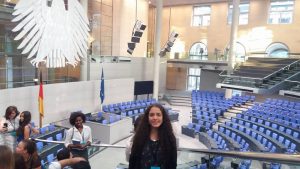Private-sector partnerships and peacebuilding: A non-binding process?


By Lucía Torres Alvarado
Student
Master in Development Interdiscipliary Studies
Universidad de los Andes – Colombia
My research is related to the phenomena of private-sector partnerships that promote development and peacebuilding in the region of Valle del Cauca in Colombia. I consider cross-sectoral partnerships as mechanisms to enhance the co-responsibility of organizations and firms. Specifically, I am interested in understanding criteria and rationalities involved in decision making processes, interactions between stakeholders and their commitment to generate regional transformations that face the challenges raised by transitional justice and peacebuilding.
In the Summer School in Giessen I assisted to the coursework Business Ethics and Human Rights. I wanted to analyze actions promoted by business actors and their ethical criteria. During the course I found many arguments to discuss legal gaps on international and domestic regulation of corporations, as well as some of the institutional legal frameworks that prompts or discourage business actions for protecting human rights. These approaches helped me to understand the high degree of willfulness and discretion (less of compulsory) that exist in
the commitment assumed by firm stakeholders during a peace process.
During my research work, I have perceived that one of the major challenges for business stakeholders is to understand their role in the transitional justice background. Thereby I also took the Comparative Constitutional Law coursework to approach transitional justice challenges in constitutional issues. Considering constitutions as outcomes of political processes I understood the commitment of business actors in transitional justice and I reflected on features of the Colombian Constitution history.
As a foreign visitor I also learnt about the challenges that peacebuilding faces in Colombia. In Berlin I visited some memorial places in which Germany has recognized the complexity and hardness of some facts of its history. This issue is particularly relevant to Colombia, especially to the recognition of victims affected by the internal armed conflict.
Cooperation efforts among entrepreneurial actors would not be only focused on the improvement of social, economic and environmental conditions of local territories but in their role as political actors interested in reparation and guarantees of non-repetition through a recognition process of the armed conflict.
I am absolutely thankful with the CAPAZ Institute for giving me the opportunity to live this wonderful experience which I otherwise would not have had. I learnt a lot about Germany culture, language and history. It helped me to achieve my personal life project, my academic and work aspirations and the intellectual commitment with my country.



